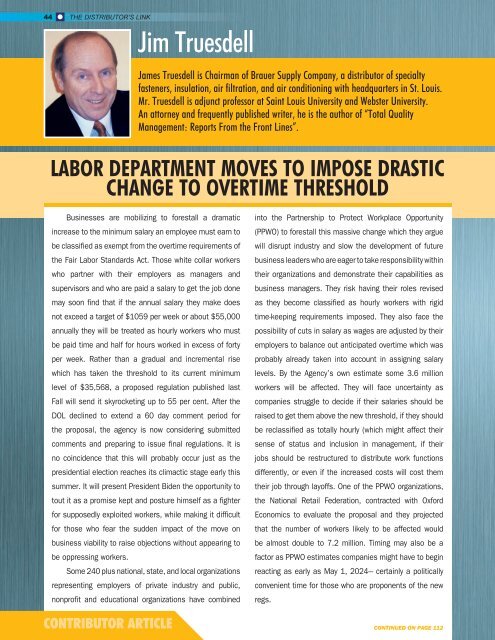SPRING 2024
Distributor's Link Magazine Spring 2024 / Vol 47 No 2
Distributor's Link Magazine Spring 2024 / Vol 47 No 2
Create successful ePaper yourself
Turn your PDF publications into a flip-book with our unique Google optimized e-Paper software.
44<br />
THE DISTRIBUTOR’S LINK<br />
Jim Truesdell<br />
James Truesdell is Chairman of Brauer Supply Company, a distributor of specialty<br />
fasteners, insulation, air filtration, and air conditioning with headquarters in St. Louis.<br />
Mr. Truesdell is adjunct professor at Saint Louis University and Webster University.<br />
An attorney and frequently published writer, he is the author of “Total Quality<br />
Management: Reports From the Front Lines”.<br />
LABOR DEPARTMENT MOVES TO IMPOSE DRASTIC<br />
CHANGE TO OVERTIME THRESHOLD<br />
Businesses are mobilizing to forestall a dramatic<br />
increase to the minimum salary an employee must earn to<br />
be classified as exempt from the overtime requirements of<br />
the Fair Labor Standards Act. Those white collar workers<br />
who partner with their employers as managers and<br />
supervisors and who are paid a salary to get the job done<br />
may soon find that if the annual salary they make does<br />
not exceed a target of $1059 per week or about $55,000<br />
annually they will be treated as hourly workers who must<br />
be paid time and half for hours worked in excess of forty<br />
per week. Rather than a gradual and incremental rise<br />
which has taken the threshold to its current minimum<br />
level of $35,568, a proposed regulation published last<br />
Fall will send it skyrocketing up to 55 per cent. After the<br />
DOL declined to extend a 60 day comment period for<br />
the proposal, the agency is now considering submitted<br />
comments and preparing to issue final regulations. It is<br />
no coincidence that this will probably occur just as the<br />
presidential election reaches its climactic stage early this<br />
summer. It will present President Biden the opportunity to<br />
tout it as a promise kept and posture himself as a fighter<br />
for supposedly exploited workers, while making it difficult<br />
for those who fear the sudden impact of the move on<br />
business viability to raise objections without appearing to<br />
be oppressing workers.<br />
Some 240 plus national, state, and local organizations<br />
representing employers of private industry and public,<br />
nonprofit and educational organizations have combined<br />
CONTRIBUTOR ARTICLE<br />
into the Partnership to Protect Workplace Opportunity<br />
(PPWO) to forestall this massive change which they argue<br />
will disrupt industry and slow the development of future<br />
business leaders who are eager to take responsibility within<br />
their organizations and demonstrate their capabilities as<br />
business managers. They risk having their roles revised<br />
as they become classified as hourly workers with rigid<br />
time-keeping requirements imposed. They also face the<br />
possibility of cuts in salary as wages are adjusted by their<br />
employers to balance out anticipated overtime which was<br />
probably already taken into account in assigning salary<br />
levels. By the Agency’s own estimate some 3.6 million<br />
workers will be affected. They will face uncertainty as<br />
companies struggle to decide if their salaries should be<br />
raised to get them above the new threshold, if they should<br />
be reclassified as totally hourly (which might affect their<br />
sense of status and inclusion in management, if their<br />
jobs should be restructured to distribute work functions<br />
differently, or even if the increased costs will cost them<br />
their job through layoffs. One of the PPWO organizations,<br />
the National Retail Federation, contracted with Oxford<br />
Economics to evaluate the proposal and they projected<br />
that the number of workers likely to be affected would<br />
be almost double to 7.2 million. Timing may also be a<br />
factor as PPWO estimates companies might have to begin<br />
reacting as early as May 1, <strong>2024</strong>--- certainly a politically<br />
convenient time for those who are proponents of the new<br />
regs.<br />
CONTINUED ON PAGE 112
















